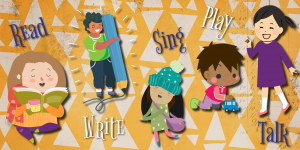
You may have heard of the 30 million word gap how children from low income families hear 30 million fewer words by the age of three than children from wealthier families. What you may not have heard is that there were some serious flaws with the methodology of this study and current researchers have different ideas about what this study actually reveals.
Newer research reveals that it is the quality of speech that matters, rather than the number of words children hear. Talking with children has much more impact on vocabulary building than talking at them, or trying to make sure that they are hearing new words every day.
“It’s about having these fluid conversations around shared rituals and objects, like pretending to have morning coffee together or using the banana as a phone. That is the stuff from which language is made.”
Reference: Quality of Words, Not Quantity, Is Crucial to Language Skills, Study Finds
How can you improve your child’s vocabulary skills?
Here are some suggestions.
Babies
- Talking in Parentese makes a huge difference. What is Parentese?It is the slowed down, higher pitched language that some parents naturally use with babies. A recent study reveals that babies respond more to language when they hear it in Parentese (also called Motherese).
- Babies read facial expressions and gestures to help them make sense of the words they are hearing, so remember to face your baby when talking to him or her.
- Ask your baby questions as you go through your day or share a book and give him or her a chance to babble back or respond. This is the beginning of conversational skills.
Article that focuses on babies
- Let’s Talk About It: 5 Ways to Build Babies’ Language and Communication Skills from Birth
- How to Support Your Child’s Communication Skills
- It Takes Two: The Roots of Language Learning
- Tips on Learning to Talk
Toddlers & Preschoolers
- Expand on what your child tells you in a serve and return style. If your child notices and comments on a bird or a tree, reply using specific words in response – say hawk or eagle instead of bird, desert willow instead of tree.
- Check out some wordless books to explore and talk about together.
- If your child loves hearing the same book over and over again, talk about different words or pictures in the book as you read it.
- Converse with your child everywhere – in the car, at the store, on a walk, or while doing laundry.
- Have fun with words! Play rhyming games and make up nonsense words.
- Ask children to tell or retell you a story using their own words.
- As you play with your child, make it a habit to introduce a new word or two. Children are more likely to remember these words if they hear them in a playful situation.
-Sarah, Children's Librarian at Martha Cooper Library
 Read, Write, Talk, Sing, Play!
Read, Write, Talk, Sing, Play!
The day children are born, their brains are primed for language. Talking with your child about anything and everything helps them build oral language skills, which are critical to early literacy!
Read more about early literacy and how you can make a difference in your child's life.

